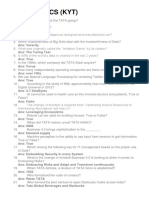CASE MS Seminar -2
Helen Flagg was an outstanding sales person in the Ajax Discount Store. She
knew the products well, kept up to date with her recordkeeping and was willing
to work overtime whenever necessary. None of her co-workers came near her
level of overall sales performance. Because of this effective record Helen was
promoted to manager of the children’s-wear department. Almost from her first
day in the new position trouble began to occur. Flagg complained about her
subordinates’ lack of motivation and dedication, feeling that they were overpaid
and that many should be fired. Naturally this caused difficulty in the department,
and two of the better sales people quit abruptly. Flagg’s superior discussed these
problems with her, but after several such discussions Helen still couldn’t
understand why she should approach her job differently. Finally, her superior
offered Helen her old job back as a salesperson with no cut in pay. At first Helen
was happy about this switch back to her old job. No more problems with those
lazy employees. But then she became worried about her lack of success as a
manager, and this caused her sales to fall. Even though her boss reinforced her on
several occasions, telling her that not everyone can succeed as a manager and
that excellent sales people are very valuable to the store, nothing seemed to give
assurance to Helen Flagg.
Questions:
THINK? Before answering the questions below or discussing the case with others,
try and work through systematically the Case-study Analysis steps 1 to 6
�1. Major problem: Management incompetency that cause skilled workers
leave the company in search of other jobs elsewhere. This deprives the
organizations of quality staff. This leads to decline in production and
profitability which in turn may result in the dissolution of the organization if
appropriate measure is not taken
2. Minor problem: the minor problem lies in the refusal of taking the blame
for her failure. Helen blames the employee for their lack of motivation and
dedication.
3. Policy or management issue: it is management issue where hellen got
incompetent in working with people and getting things done successfully.
So, she better ask for help in ways of managing people or she has to take
training with regard to leading and managing.
4. The alternative solution can be the following:
A. Demoting Helen with the same pay to her previous work
B. Giving Helen training and hire someone to assist her in the job
C. Get hellen fired
5. Possible solution; Demoting Helen with the same pay to her previous work
6. Consequences of the possible solution: offering the old job to hellen create
another problem. She cannot be effective as she was before because of
psychological and emotional trauma. She felt that she was not effective in
managing and this leads her to think as ineffective women. And this again
results in fall of sales; the company is really in big trouble.
7. Management context : she create a negative environment in the work and
instill fear, she thinks that employees are overpaid and must be fired if not
motivated to work hard
�CONTEXT? All managers make decisions within their own unique context. Identify
the context of the key manager/supervisor decision-maker in this case-study.
1. What can Flagg’s boss do now? He tried his best in encouraging hellen to perform
better in her old job by not cutting the pay. The boss continuously telling her she is
valuable to the store as a sales person. But she is unable to perform as she was and
because of this sales go down. Hence, the boss should hire another effective sales person
in place of hellen.
2. Should she have been demoted back to her old position? Why? Why not? No.
she should be fired I think because the sales go down.
3. Why was she promoted in the first place? She was promoted because she was
very effective in her job as sales person than other staffs. And the boss got the
wrong perception that if one succeeds in one area he /she may succeed in other
area too.
4. What might her superior have done to help Helen in the managerial
assignment? He has to give her training and support her in the new position by
offering assistantship to her.
5. What kinds of problems might Helen have with co-workers when she was back
in her old job? Hellen might have problems with coworkers when she was back in
her old job like difficulty of working with them as a team and sharing important
information since she feels incompetent and discouraged.
CASE MS Seminar -3
�Dick Talbot had started with the company as an office boy at the age of 16. Now,
at age 59, he was the training director and he was in trouble. During his career,
Dick had spent time in nearly every department. While none of his service was
outstanding, he was a reliable, hardworking employee. Because of his varied
experience, he had been assigned to the personnel department several years ago
when the company started a methods improvement program and needed a
trainer. Dick was sent to school by the company to become knowledgeable in the
area of methods improvement, and he became very enthusiastic about the
subject. Though he had never finished high school, the company had sent him to
several courses on a variety of subjects, and he had done some reading on his
own. He did not, however, avail himself of the company’s tuition remission plan
which would have allowed him to go to school at night to improve his formal
education. He conducted several classes in methods improvement and then
started a program for the preparation of procedure manuals. During this period
the company grew rather rapidly and the training function expanded. Having no
one else available, the personnel vice president promoted Dick to the position of
training director. He also hired a young man with a master’s degree as Dick’s
assistant. As time went on, three more bright young training analysts with
master’s degrees were added to the staff to meet the mounting requests for
training programmes from the major divisions of the company. The company was
now conducting two management development programmes, one for firstline
supervisors, and one for middle management, a college training programme for
college graduates hired as executive trainees, a work measurement program, an
orientation programme, and several skill programmes. In other words, the
training department was now an important function, and Dick found that he was
�unable to cope with his increased responsibilities. He was afraid of the bright
young men who worked for him but did not respect him. He couldn’t handle the
dynamic executive trainees, and he found his lack of formal education a definite
handicap. He postponed decisions and continually withdrew from controversy. He
exercised no leadership and his assistant assumed the responsibility. He longed
for the days of the first methods improvement program he taught. The world was
passing him by; to escape, he started drinking excessively. His rate of absenteeism
climbed and the personnel vice president spoke to him about the problem. Dick
agreed too complete physical, as well as psychiatric help at company expense.
The personnel vice president kept Dick in his position as training director even
though the department was being handled by Dick’s assistant, who by now was
openly critical of Dick. After a period of treatment, Dick did not show any
appreciable improvement and the personnel vice president wondered what to do
next.
Questions:
THINK? Before answering the questions below or discussing the case with others,
try and work through systematically the Case-study Analysis steps 1 to 6.
1. Major problem: lack of formal education that leads to management
incompetency
2. Minor problem: alcoholism, absenteeism and unable to make decision
because he felt disrespected by his subordinates
3. Policy issue: the company offered him a chance to continue his education
but he was not interested to attend. In this regard the company should
have a clear policy and procedure on what to do when employees refuse to
take formal education given by the company.
� Management issue: because of the lack of formal education and the growth
of the department, he cannot get the required knowledge and skills to
continue in his management position.
4. Rejected solution;
a. When dick stop education given to attend, the company should ask the
reason and present him other opportunity
b. The company promoted dick for the position because no one was
available. It is not the right decision. The company should look for
qualified applicants in the market
5. Possible solution: the problem of dick is lack of formal education that leads
to him to decide not on matters so the possible solution is replacing dick
with the one who has the formal education and competency
6. Consequence of the chosen solution:
The new training director may not work well with dick
The new training director may lack the necessary skills to manage
and may not be familiar with all aspect of department work albeit.
CONTEXT? All managers make decisions within their own unique context. Identify
the context of the key manager/supervisor decision-maker in this case-study.
Management context; Dick was not updating himself to the new required skills of
managing. The management context of dick was suited to stable organization
where change was not assumed to happen.
1. What course of action should be taken now by the personnel vice president?
Action should be taken now by the personnel vice president: Call for a discussion and tell
his expectation on him. If Mutual understanding not coming, ask him to resign his job with
good Incentive as he was in his retirement age. Sometimes, our decision does not work the
� way we think, also the decision of making an office boy a training director was not a great
decision. Some employee proves themselves useful for the company although they are less
educated for themselves. Despite the fact, the personnel vice president should offer the
opportunity to continue his formal education once again or should replace him by competent
worker.
2. What can be done with an employee whose position has outgrown his abilities
and who has long service? Offer him training and development and hire
assistants and experts who can do advisory service to dick
3. Is the personnel vice president at fault for promoting Dick in the first place? No.
during the time he was very experienced man though has no formal education.
But vice president should find qualified worker from the market elsewhere.
4. Is it possible that he feels guilty about his error of judgement in Dick’s case and
that is coloring his handling of the problem? Yes. Someone may feel guilt if the
decision he made is wrong and lead the company in trouble. At the end of the
day, it costs him and the company to much because of his incompetency.
5. Should a company feel any sense of responsibility of promoting a man over his
head? Yes. The company should clearly communicate the HRM practice of the
company and act accordingly not to hurt the morale of dick who has been serving
for so long

























































































